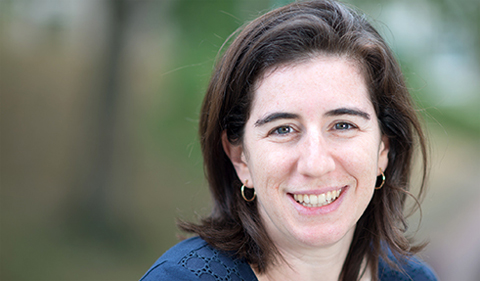Dr. Nicole Kaufman, Assistant Professor of Sociology, wrote two papers presented at the American Sociological Association annual meeting in August.
For the session on “Religion in the Broader Social World,” Kaufman presented “Faith in Reentry: Approaches to Religion at Non-governmental Organizations Working with Formerly Incarcerated People.”
For the “Deviance and Social Control” regular session, she was the non-presenting lead author of “Beyond Punishment: The Penal State’s Interventionist, Covert, and Negligent Modalities of Control” (co-written with Joshua Kaiser and Cesraéa Rumpf).
“I received feedback from a helpful discussant and connected with UW-Madison alums at the yearly Wisconsin party,” said Kaufman. “I learned about some new historical research on women’s carceral institutionalization that was intriguing. ”
Abstract for Faith in Reentry: This paper examines variation in the approaches that non-governmental organizations (NGOs) have taken in their work with formerly incarcerated people. I contextualize the heavy involvement with NGOs with former prisoners today in historical patterns of advocacy and service by religious organizations. Then, using data on 18 NGOs working with formerly incarcerated people in Wisconsin, I develop an inductively formed classificatory typology identifying NGOs’ varied religious approaches to participants in the current period; I differentiate between what I call secular, religiously inspired, and reciprocally religious organizations. I summarize the commonalities of the organizations in each type in terms of denomination, funding, predominant description of the work, patterns in service provision by gender, age of the organization, and location. I discuss the advantages of this typology, including its comprehensiveness, attention to varied and nuanced uses of faith, and concern with how NGOs activate faith in institutionally specific settings. While this paper draws most explicitly on the sociology of religion, this systematization of how faith is activated could be valuable to criminologists and penologists.
Abstract for Beyond Punishment: This paper investigates penal state control in the lives of criminalized people by analyzing punishment alongside various other forms of penal state involvement. We propose the concept of modalities of penal control and identify three additional modalities besides expressive punishment: interventionist, covert, and negligent penal control. We distinguish these modalities by locating them along three spectra of penal state involvement: legal/extralegal, surface/submerged, and positive/negative. We illustrate cases of each modality, using data drawn from three distinct projects based in Chicago, Southern Wisconsin, and a national sample; the data include observations of post-prison groups and homes, interviews with criminalized people and NGO staff, and information from statutory and regulatory legal research. Our research highlights the need for comprehensive reform that overhauls not just forms of expressive punishment but penal state involvement more broadly. We suggest that moving the focus beyond punishment can generate not only a deeper understanding of how the penal state involves itself in criminalized people’s lives, but also how to comprehensively reform a wide range of modalities of penal control.
The Annual Meeting of the American Sociological Association provides the opportunity for professionals involved in the scientific study of society to share knowledge and new directions in research and practice. Nearly 600 program sessions are convened during the four-day meeting held every August to provide participation venues and networking outlets for nearly 3,000 research papers and more than 4,600 presenters. This year’s topic: Sexualities in the social world.

















Comments